|
THE STRUGGLE FOR TAMIL EELAM
'Voice of Tamil Nation' Rally
தமிழ்த் தேசியத்தின் குரல்
Kailasapathy Hall, Jaffna, Tamil Eelam
19 June 2005
[Courtesy:
Peace Secretariat, Liberation Tigers of Tamil Eelam]
 Introduction &
Text of Declaration
Introduction &
Text of Declaration
 "Tamils had their own
government once and we have decided to return to that" -
S. Mohandas, Vice
Chancellor of
University of Jaffna
"Tamils had their own
government once and we have decided to return to that" -
S. Mohandas, Vice
Chancellor of
University of Jaffna
 Do not attempt to
suppress us - Srilasri Somasundara Swamikal
Do not attempt to
suppress us - Srilasri Somasundara Swamikal
 We are united
though our language - Moulavi Sahil Moulana of Jaffna
Mosque
We are united
though our language - Moulavi Sahil Moulana of Jaffna
Mosque
 Sinhala chauvinism
will never permit a just approach to Tamils - Rev
Fr Bernard
Sinhala chauvinism
will never permit a just approach to Tamils - Rev
Fr Bernard
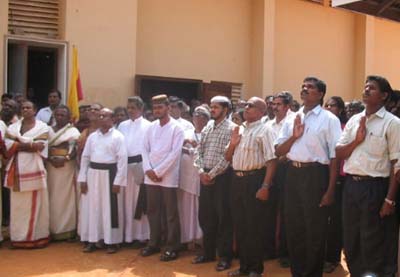 Introduction
& Text of Declaration Introduction
& Text of Declaration
More than thousand dignitaries assembled at the Jaffna
University Kailasapathy hall on Sunday, 19 June 2005 and
declared, "we will defeat the Sinhala Buddhist chauvinism to
reclaim our traditional land from the occupying forces and
determine our own future in our own land using our own
strength."
The gathering, named "The Voice of Tamil Nation"
started at 10.45 am and concluded at 1.30 pm. It was
presided by the president of the consortium of humanitarian
agencies, S Paramanathan. Intellectuals, university
academics, heads of institutions, religious leaders of
Hindu, Christian and Islam religions, representatives of
civilian based and village based organizations attended the
gathering.
The event was inaugurated by the raising of the Tamil
national flag by Selvakumar, past president of the
university students association. Lamp was then lit by many
dignitaries including Jaffna University Vice Chancellor,
religious leaders, parent of a martyr, head of fishermen
society, president of national uprising consortium and
others.
Rev Fr Bernard explained in his talk the historical
background. This was followed by speeches about the
necessity for a Tamil nation by, head of the Nallur temple
chapter, Srilasri Paramasamy Swamikal, Sahis Moulana,
Moulavi of Jaffna Mosque, Member of Parliament S
Sivajilingam and the Vice Chancellor of Jaffna University, S
Mohanadas.
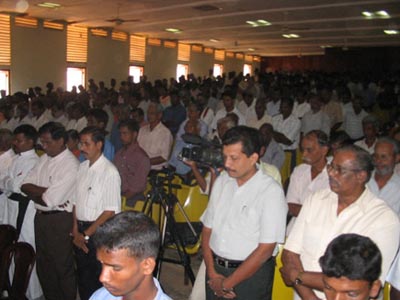 At
the end of the meeting everyone stood up raised their hands
and read the declaration in unison. The declaration was
released to inform the international community and the
southern leadership about the situation in Tamil homeland. At
the end of the meeting everyone stood up raised their hands
and read the declaration in unison. The declaration was
released to inform the international community and the
southern leadership about the situation in Tamil homeland.
The text of the declaration is as follows.
"Sinhala
Buddhist chauvinism is staging a dangerous dance in
south Sri Lanka. This is nothing new to the Tamils. Ever
since the island got independence Sinhala Buddhist
chauvinism has maintained that the entire island must be in
its control.
Sinhala Buddhist chauvinism has ignored the fact that Tamils
have lived in this island for a long long time with their
own sovereignty. It undertook many actions to make Tamils
second-class citizens in this island.
Tamils are oppressed not only in the areas of
citizenship,
land,
language and
education they are also
oppressed militarily. Historically, the northeast of the
island has been the
homeland of the Tamils.
Tamil speaking people hold the firm view that they must
release themselves from the
oppressive rule of Sinhala Buddhist chauvinism and live a
life of freedom. Thirst for this freedom is the result
of
50
years of experience of living under Sinhala Buddhist
chauvinism. Today Sinhala Buddhist chauvinism is
showing its cruel face by refusing even the limited joint
structure to channel tsunami relief.
We vow to defeat this cruel Sinhala Buddhist chauvinism and
reclaim our land from the occupying forces and determine our
own future using our own strength in our own land."

"Tamils
had their own government once and we have decided to return
to that" - S. Mohandas, Vice Chancellor of University of
Jaffna
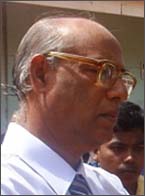 Tamils
demand for self-determination is not something that sprung
up today or yesterday. We had this right for a long time. We
have now moved from our weakened situation in this regard
and have regained our strength and have decided to take our
right to self-determination. Tamils
demand for self-determination is not something that sprung
up today or yesterday. We had this right for a long time. We
have now moved from our weakened situation in this regard
and have regained our strength and have decided to take our
right to self-determination.
From ancient times when the Tamils of Tamilnadu identified
themselves as unique in language, art, religion, and
culture, Tamils of Ceylon also have identified us as a
unique people.
Tamils have ruled Ceylon. They set up palaces in Jaffna.
History exists when Eelam Tamils have been a challenge as
well as a friend to south Ceylon and Tamilnadu.
It was
Arumuganavalar from Jaffna who has the distinction of
being the first to raise the Tamil national awareness of the
60 million Tamils of
Tamilnadu and for emphasising the right of
Tamils to self-determination.
Although the governments of south Ceylon were fearful of
recognizing our uniqueness, the
European colonisers who ruled us recognized it. The
"Thesavalamai" law in practice today is based on our
traditional customs, culture, and lifestyle. It is a symbol
of our nationhood. The Dutch colonisers by incorporating it
in their law book acknowledged our nationhood.
Today we are identified as a unique nationality
in the international arena. In this context no one can
deny
our right to self-determination.
Ever since Ceylon gained independence we wanted to live
without loosing our uniqueness, without war, without
bloodshed, and together with everyone else. That is what we
want even today.
The majority community rejects our uniqueness and our right.
In this situation we are forced to take into our hands our
right to self-determination.
Today's event, "voice of the Tamil nation" is the outcome of
this situation. We are here today with drums beating,
trumpets blowing, hands clapping in unison, and our voices
raised to announce our determination.
I like to add that no other university in the world has
privilege that Jaffna University has. That is the growth of
the struggle for nationhood and the growth of Jaffna
University have gone hand in hand.

Do not
make any attempt to suppress us - Srilasri Somasundara
Swamikal
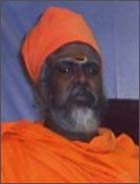 "Today's
message is directed at the community that has kept us
oppressed for the past twenty years. "Today's
message is directed at the community that has kept us
oppressed for the past twenty years.
Sinhala Buddhist chauvinism that oppressed us all these
years is keen to oppress us again and again. With this in
mind the Buddhist monks are testing out what they can and
cannot do to oppress us through their fasting.
We the priests are again issuing a request to these Buddhist
monks. Do not oppress us again and again. Give voice for our
freedom instead.
At a time when we must all together build a national
structure for rehabilitation, development and peace, it is
tragic that the Buddhist monks are acting with the view to
weaken such moves.
All religions have the right to exist in this country. All
religions are unique. Buddhism is not the only religion of
the people. Time has come to tell the Buddhist monks that
there are also other religions practiced in this land.
It is not proper that Buddhist monks are immersing
themselves in politics. Politics is necessary for the
religious leaders dedicated to spirituality. But it must
stay within its limits. We think the Buddhist monks are
betraying Buddhism by putting their views into actions on
inappropriate issues.
As the voice of the all the Tamil people in the north this
is what we would like to tell the Buddhist monks. Do not
oppress our community again and again. Let us live. Give us
the freedom that should be ours.
Let us unite. Let us live together. Let us give voice for
the freedom of our land and people."

We are
united though our language - Moulavi Sahil Moulana of Jaffna
Mosque
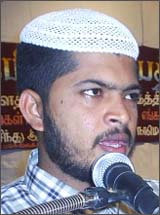 "Today
unity has gone hiding somewhere. Even if unity seeks us out,
forces that are constantly undermining this unity is growing
amongst us. It is trying to cut the roots of our unity. "Today
unity has gone hiding somewhere. Even if unity seeks us out,
forces that are constantly undermining this unity is growing
amongst us. It is trying to cut the roots of our unity.
Many of our brothers from other districts were selected to
study at the Jaffna University medical college. But
politicians from other districts frightened them saying that
Muslim students are not safe in Jaffna. This is a big
stumbling block for the Muslim people who have started to
resettle in Jaffna.
There are no threats or hardships for us Muslims who have
resettled in Jaffna. We are free to live here. Everyone
here, including the LTTE and members of parliament, are
giving their voices for our freedom as well.
Although we are separated by our religions we are all one
people through our language. This is what we want to tell
the Sinhala Buddhist chauvinistic forces. Do not try to
oppress us. Respect our feelings and work for our rights".

Sinhala chauvinism will never permit a just approach to
Tamils - Rev Fr Bernard
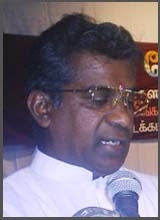 I
have been asked to give my talk about the aim of today’s
event and the background to it. Thus my talk will be along
these lines. I
have been asked to give my talk about the aim of today’s
event and the background to it. Thus my talk will be along
these lines.
The views of the Jaffna people were
gathered recently through a research project. The aim of
this event is to let the international community and the
south Ceylon community know of these findings in the
presence of leaders and intellectuals respected by the
people of Jaffna and with their blessings.
Three
inter related issues have come up. They are, it is
Sinhala chauvinism that is standing opposed to us in the
name of language and religion; the historical background to
this; and the need to safeguard our right to
self-determination from this chauvinism.
It is very
important to understand this aim and therefore some
explanation is needed. Firstly, we are not disrespecting the
Buddhist religion or the Sinhala people. On the contrary we
respect both. Secondly, when we talk of our nationalism we
do so while respecting similar feelings of other people. But
we raise our voice against any exaggerated feeling of
nationalism that attempts to spread its hegemony on us thus
wounding our self-respect. We have not failed to notice that
there have been voices in south Ceylon then and now against
this Sinhala hegemony.
People’s views
Sinhala hegemony is the
cause of the 25 years of war that is crushing us. In
the 50 years since independence there has never been a
strong political community, or political culture, or
leadership in south Ceylon to break this Sinhala hegemonic
tendency. From now on we will determine our own future. In
order to explain these views it is necessary to look into
the political history.
Manifestations of Sinhala
chauvinism
Citizenship Act - Soon after independence from Britian
the new government in Ceylon introduced a citizenship act
and through it denied the Tamils in upcountry their
citizenship and their right to vote. Not only that through
this the government wiped out any political bargaining
strength for the Tamil people.
At the same time the
Sinhala Mahasangam was applying pressure to make Sinhala the
only official language and Buddhism the state religion.
Accordingly, late Bandaranayake, former Prime Minister, who
in earlier decades demonstrated his broad outlook by
proposing a federal system of government for Ceylon, now
turned into an opportunist and started shouting the Sinhala
only slogan in 1956. He won the elections with landslide
victory as a result.
Sinhala only
“Two languages on country – one language two country”,
dismissing these words of a Sinhala leader, in 1956 Sinhala
was made the only official language. Tamil leaders started
fasting in front of the parliament opposing this. That was a
non-violent struggle. But violence was used to break that
protest. Massive protests broke among Tamil people objecting
to the violence. These too were non-violent protests.
Banda – Chelva pact
In order to manage the Tamil protests Prime
Minister Bandaranayake held talks with the leader of the
Tamil Arasu political party, Chelvanayakam. A pact was
signed by the two following the talks. The basis of this
pact is the federal system of government.
The following were included in this
pact,
o Tamil was accepted as the language of the minority in
Ceylon.
o Tamil to be made the language of
administration in the northeast. .
o Create district
councils in the Northeast and.
o Reform the settlement schemes and the citizenship act.
But Buddhist leaders opposed this pact. J R
Jayawardhana also staged protests against it. Unable to face
the opposition to the pact,
Bandaranayake unilaterally ripped the pact in front of them.
Government sponsored settlements in Tamil areas
As a result of these settlements the number of
Sinhala people in the eastern district increased by 10 fold
from 1946 to 1976. This seriously affected the Tamil people.
Tamils who were already a minority at the country level were
also made a minority in their traditional homeland. When new
electoral districts were created their representation and
their bargaining strength were severely reduced.
Dudley – Chelva pact
Another pact was signed in 1965. This was signed
by Prime Minister Dudley Senanayake and Chelvanayakam. The
following were contained in this pact,
o To make Tamil the administrative
language in the Northeast.
o Use Tamil in the courts
in Northeast.
o When land is allocated it must first
be offered to landless Tamils in that area and then to
Tamils in other areas and lastly to other people. .
Even for these very limited demands, there
was opposition. The Sri Lanka Freedom party that was in
support of the Banda-Chelva pact, having lost power, now
became the opposition party that opposed this new pact. As
before Buddhist leaders also opposed the pact. As a result
the government could not implement this pact for a long
time.
New constitution in 1972
United Front government that won the elections
in 1970 initiated the proposal for a new constitution. The
Tamil Arasu party put forward the following to the council
considering the new constitution.
o Incorporate the Dudley-Chelva pact
into the constitution.
o Make Tamil language the
medium of education for the Tamil students.
All of these were rejected by the council.
All other Tamil parties except the Tamil Arasu party put
forward the following suggestions.
o Give Tamil equal status.
o Grant
citizenship to those from whom it was taken away.
o
The constitution must not be favouring one or the other
community.
All of these were also rejected. Not only
that, clause 29 in the then existing constitution that
granted protection to the minorities by ensuring equality of
status for all religions and languages was removed in the
new constitution and Buddhism was given a special place.
Another constitution in 1978
The new constitution of 1978 also did not take
into account the shortcomings in the 1972 constitution in
relation to the Tamils. Instead this too became a document
that reinstated Sinhala Buddhist hegemony. It became
impossible to expect a respectable life from the south
Ceylon society.
Discrimination in education
Yet another manifestation of the Sinhala hegemony
was the “standardisation” procedure implemented for the
university entrance. This created a huge hurdle to the
higher education of Tamil students. This came when Tamil
people were already affected in the areas of job
opportunities and job promotions due to the Sinhala only Act
and the anti-Tamil sentiments.
Independent state
policy replaces Federal system policy
Only when Tamils realised that all these actions
were destroying their identity, their feelings of Tamil
nationalism gained strength.
In 1976 at the
Vaddukoddai conference the decision was taken to secede from
Ceylon. The victory of the candidates who stood on the
independent state ticket made the political views of the
Tamils crystal clear.
The struggle for Tamil rights
did not start with the demand for an independent state.
Tamils original aim was to set up a political structure to
share power within an undivided country in order to cherish
Tamil language and culture and have equal opportunity in the
economic life of the country.
Not only that Tamils were actually opposed to the
division of the country. In the 1970 election two candidates
stood on the independent state policy in two electorates.
They both lost the elections. In fact the Tamil Arasu party
campaigned against the idea of dividing the country in 1970.
This shows clearly that Tamils opposed the division of the
country in 1970. But all of them were gradually pushed into
adopting the independent state policy.
These Tamils
held the view that although we have two separate, Tamil and
Sinhala, socio-cultural history, and while preserving this
uniqueness, at the national level we prefer the common
identity as “Ceylonese” where all are treated as equals.
However, the majority community at that time rejected this
and promoted the idea that “Ceylonese = Sinhala Buddhists”.
The path to reach the goal
The initial path taken by Tamils to achieve the
goal was not by violence but through non-violence. But….
In 1956 Tamils protested the Sinhala only act through
non-violent protests.
Violence was used against these protesters. Sinhala
thugs killed 150 people.
In 1958 Tamils protested
the abrogation of Banda-Chelva pact. Violence was prize
given to them yet again.
Roaming crowds killed hundreds of Tamils and houses and
properties belonging Tamils were burned down.
When
Tamils protested the Sinhala only act military was sent to
Jaffna for the first time and at least one Tamil civilian
was killed. Many others were injured. Tamil leaders and
members of parliaments were arrested. Yet again the prize
for non-violent struggle was violence.
In 1974
during the peaceful World Tamil Research conference
violence by police resulted in the death of 9 Tamil
civilians.
After the 1977 elections (one month
after)
massive violence against Tamils was let loose and
roaming crowds killed hundreds of Tamils within the first
two weeks.
After the 1977 violence against Tamils
similar violence in mass scale took place against Tamils.
The one in
1981 and
1983 were particularly vicious. Those in the government
were also involved in this mass violence against Tamils.
In the report about the situation in Ceylon prepared by
International Jurists, Paul Seighart states the following.
“The interval between these communal violence has
been getting shorter and shorter. These incidents continue
to take place throughout the country. The severity of these
violent incidents has also been increasing. The killing of
Tamils, seriously wounding them, stealing their property,
and taking away their homes is all not independent
incidents. They are becoming heinous regular occurrences….
One characteristic about all of the communal violence is
that Tamil people have not taken revenge on the Sinhala
people living amongst them. Therefore in each communal
violence those who have died are Tamils.”
Armed
struggle
Trust in non-violent struggle weakened and the
view that armed struggle is the only available option gained
strength among Tamils. In 1978 an armed group named
“Liberation Tigers of Tamil Eelam” started among the Tamil
youth. This group that started as a small guerrilla force in
due course has grown into a strong conventional military
force.
Role of the security forces
The Sinhala
chauvinist political leadership used its military to crush
the Tamil people’s struggle. The military that was purely a
ceremonial outfit in due course had to work very hard to
regain its good name in the international arena. Such is the
cruelty lashed out by the military.
Military is responsible for rape, torture, arbitrary arrest,
extra judicial killing, involuntary disappearance and many
other human rights violations. More than 65,000 innocent
civilians died as a result of this military cruelty and
indiscriminate bombing. There were no buildings left
undamaged. Under the cover of the “Prevention
of Terrorism” act every single human right declared in
the international human rights covenants and conventions
were violated.
Thimpu talks in 1985
This talk was arranged by India with the aim of
bringing the war to an end. All the Tamil representatives
who took part in this talk
put forward the following points, Tamils are a nation,
their homeland is the continuous territory of northeast of
Ceylon, and Tamils have the right to self-determination.
Ceylon government rejected these points and the war
intensified and dragged on.
Ceasefire agreement
LTTE came forward to sign this agreement from a
position of military strength. But the selfish competitive
political culture of south Ceylon blunted this effort. There
are no signs that the day to day life of the Tamil people is
going to improve. One of the hurdles for this is also the
continued maintenance of the high security zones by the
military. Farmland, fishing, schools and many other issues
have not returned to normalcy.
Today
For the people affected by the
tsunami
destruction – to help the people affected by the tragedy
that melted the hearts of people all around the world – to
set up a very limited structure –
that too a joint structure – there is no space. More
than 50 years chauvinism has dried up the humanitarianism.
In conclusion
There is no grain of hope that this chauvinism will allow a
just approach to find a solution to the Tamil people’s
right. Therefore Tamil people are declaring in front of
this gathering that they will safeguard their land with
their own strength and determine their own future. |